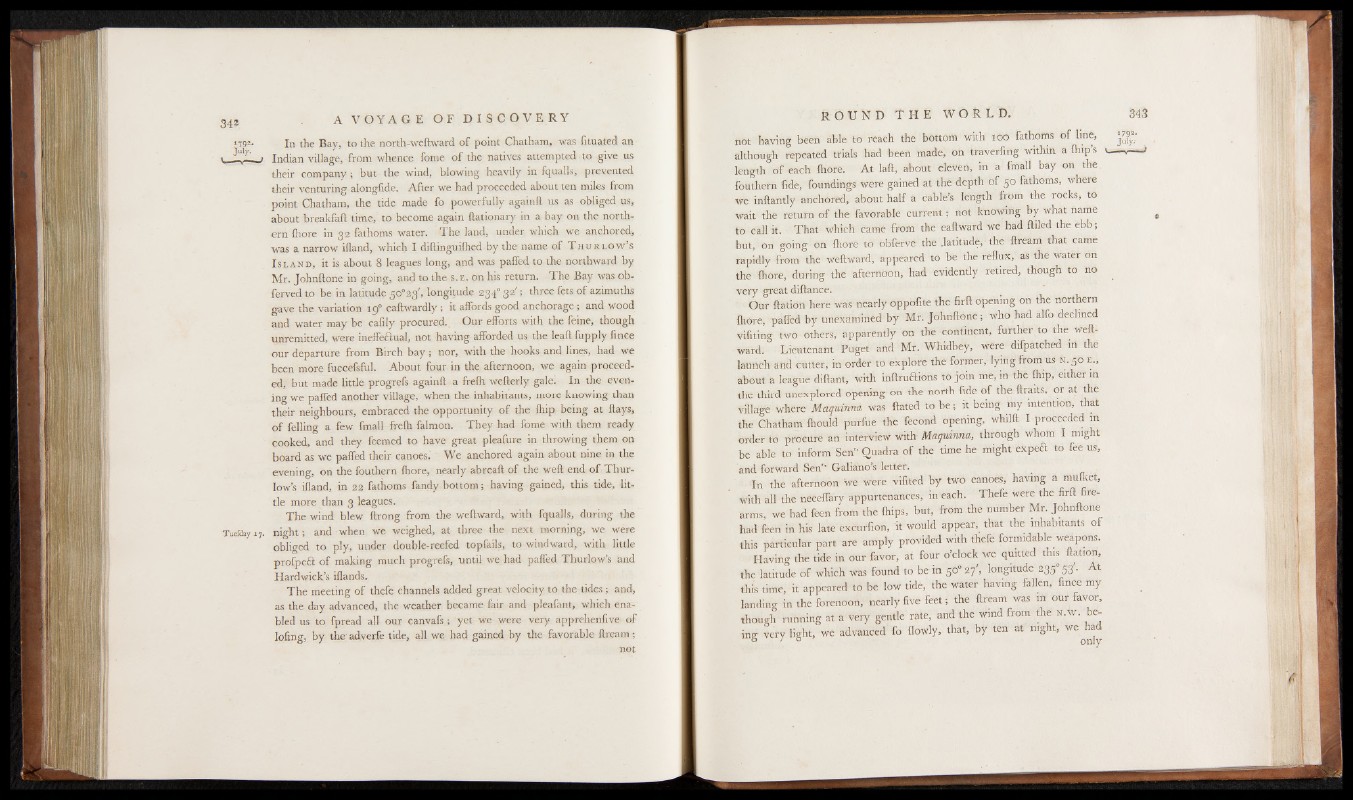
1792.
July-
In the Bay, to the north-weftward of point Chatham, was fituated an
Indian village, from whence fome o f the natives attempted to give us
their company; but the wind, blowing heavily in fqualls, prevented
their venturing alongfide. After we had proceeded about ten miles from
point Chatham, the tide made fo powerfully againft us as obliged us,
about breakfaft time, to become again llationary in a bay on the northern
Ihore in 32 fathoms water. The land, under which we anchored,
was a narrow illand, which I diftinguilhed by the name of T h u r l o w s
I s l a n d , it is about 8 leagues long, and was palled to the northward by
Mr. Johnftone in going, and to the s.E. on his return. The Bay was ob-
ferved to be in latitude go023', longitude 2340 32'; three fets o f azimuths
gave the variation 19° eaftwardly; it affords good anchorage; and wood
and water may be eafily procured.^ Our efforts with the feine, though
unremitted, were ineffectual, not having afforded us the leaft lupply lince
our departure from Birch bay ; nor, with the hooks and lines, had we
been more fuccefsful. About four in the afternoon, we again proceeded,
but made little progrefs againft a frelh wefterly gale. In the evening
we paffed another village, when the inhabitants, more knowing than
their neighbours, embraced the opportunity of the Ihip being at flays,
of felling a few fmall frelh falmon. They had fome with them ready
cooked, and they feemed to have great pleafure in throwing them on
board as we paffed their canoes. We anchored again about nine in the
evening, on the fouthern Ihore, nearly abreaft o f the weft end of Thur-
low’s ifland, in 22 fathoms fandy bottom; having gained, this tide, little
more than 3 leagues.
The wind blew ftrong from the weftward, with fqualls, during the
TucCday 17. night -, and when we weighed, at three the next morning, we were
obliged to ply, under double-reefed topfails, to windward, with little
profpeft of making much progrefs, until we had paffed Thurlow’s and
Hardwick’s iflands.
The meeting o f thefe channels added great velocity to the tides; and,
as the day advanced, the weather became fair and pleafant, which enabled
us to fpread all our canvafs; yet we were very apprehenfive of
lofing, by the- adverfe tide, all we had gained by the favorable ftream;
not
not having been able to reach the bottom with too fathoms of line, V<palthough
repeated trials had been made, on traverfing within a fhip s •_
length o f each Ihore. A t laft, about eleven, in a fmall bay on the
fouthern fide, foundings were gained at the depth of go fathoms, where
we inftantly anchored, about half a cable’s length from the rocks, to
wait the return of the favorable current; not knowing by what name e
to call it. That which came from the eaftward we had ftiled the ebb;
but, on going on Ihore to obferve the .latitude, the ftream that came
rapidly from the weftward, appeared to be the reflux, as the water on
the Ihore, during the afternoon, had evidently retired, though to no
very great diftance.
Our ftation here was nearly oppofite the firft opening on the northern
Ihore, paffed by unexamined by Mr. Johnftone; who had alfo declined
vifiting two others, apparently on the continent, further to the weftward.
Lieutenant Puget and Mr. Whidbey, were difpatched in the
launch and cutter, in order to explore the former, lying from us N.gb E.,
about, a league diftant, with inftruftions to join me, in the fhip, either m
the third unexplored opening on the north fide of the ftraits, or at the
village where Maqmnna was ftated to be; it being my intention, that
the Chatham fhould purfue the fecond opening, whilft I proceeded in
order to procure an interview with Maquinna, through whom I might
be able to inform Sen" Quadra of the time he might expeH to fee us,
and forward Senr* Galiano s letter.
In the afternoon we were vifited by two canoes, having a muflcet,
with all the neceffary appurtenances, in each. Thefe were the firft fire-arms
we had feen from the fhips, but, from the number Mr. Johnftone
had feen in his late excurfion, it would appear, that the inhabitants o f
this particular part are amply provided with thefe formidable weapons.
Having the tide in our favor, at four o’clock we quitted this ftation,
the latitude of which was found to be in 50° 27, longitude 235 53. t
this time, it appeared to be low tide, the water having fallen, fince my
landing in the forenoon, nearly five feet; the ftream was m our favor,
though running at a very gentle rate, and the wind from the n .w . being
very light, we advanced fo flowly, that, by ten at night, we had